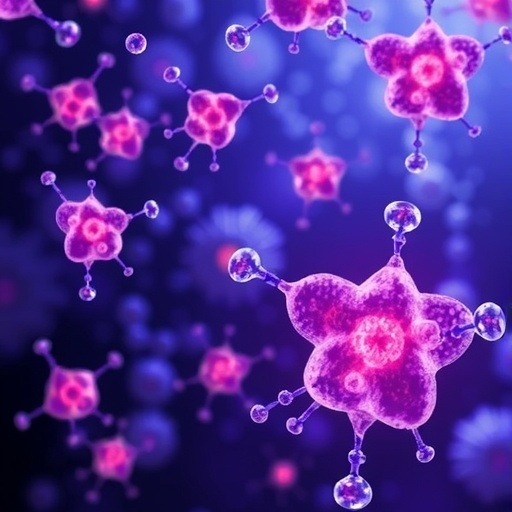In a groundbreaking new study published in BMC Cancer, researchers have unveiled critical insights into the intricate relationship between immune cells and meningioma, a common tumor of the central nervous system that poses significant health risks and predominantly affects the aging population. This research employs advanced genetic tools to clarify previously elusive mechanisms, offering promising avenues for future therapies targeting this complex tumor type.
Meningioma, historically recognized for its challenging clinical management and uncertain pathogenesis, has drawn attention for the potential influence of the immune system on its progression. Despite increasing evidence linking immune function to various cancers, the precise role of immune cells in meningioma formation and growth has been largely unexplored until now. The study leverages state-of-the-art genome-wide association studies (GWAS) to dissect these connections with unprecedented granularity.
Central to the investigation is the application of a two-step, two-sample Mendelian randomization approach—a powerful epidemiological technique that uses genetic variants as proxies to infer causality between biological traits and disease outcomes. By analyzing large-scale genetic data sets associated with meningioma, cyclic cytokines, and immune cell populations, the researchers successfully unravel complex causal networks underlying tumor development.
Eighteen distinct immune phenotypes emerged as significantly correlated with meningioma risk, highlighting the multifaceted influence of immune cell diversity on tumor biology. Among these, particular attention was drawn to specific subsets of T cells and dendritic cells, whose levels and functional states appeared to modulate the probability of tumorigenesis, suggesting immune system dysfunction may have a tangible etiological role.
One standout finding of the study was the identification of the Naive CD4-CD8- T cell subset percentage within total T cells. This unconventional T cell population showed a significant association with increased meningioma risk, with an odds ratio pointing to its potential promoting effect. The statistical robustness indicates that these naive T cells, previously less studied in the context of brain tumors, warrant closer examination for their immunological impact.
Similarly, measurements of the forward scatter area (FSC-A), a proxy for cell size and granularity on myeloid dendritic cells, were linked to enhanced meningioma susceptibility. This phenotypic characteristic suggests that dendritic cell activation states or developmental stages might influence tumor milieu, providing a mechanistic insight into how innate immune regulation intersects with neoplastic processes.
Crucially, the study delves deeper by investigating cyclic cytokines as mediators in the immune-to-tumor axis. Cytokines, the signaling molecules orchestrating immune responses, can influence tumor progression by altering cellular communication and microenvironmental conditions. The analysis revealed Matrix Metalloproteinase-1 (MMP-1) as a pivotal mediator facilitating the effect of the identified immune cells on meningioma risk.
MMP-1, known for its role in extracellular matrix remodeling and tissue invasion, has been implicated in various cancers but its contribution in meningiomas remained under-characterized. The study’s mediation analysis quantified the proportion of immune cell effects on meningioma that could be explained through MMP-1 levels, highlighting that this matrix metalloproteinase accounts for nearly 7-9% of the causative pathway, underscoring its potential as a therapeutic target.
The two-step Mendelian randomization strategy implemented enabled the distinction between direct immune cell effects and those modulated indirectly via cytokine activity, thereby providing a layered understanding of the tumor-immunity interface. By harnessing genetic instruments specific to immune cell traits and cytokine expression, the researchers effectively mitigated confounding factors, bolstering the causal inference.
From a clinical perspective, these findings introduce the possibility of modulating the immune landscape or targeting MMP-1 to influence meningioma development and progression. Interventions designed to recalibrate the immune microenvironment or attenuate detrimental cytokine activity could revolutionize treatment paradigms, reducing reliance on invasive procedures and enhancing patient outcomes.
Moreover, the identification of specific immune cell phenotypes associated with meningioma risk presents new biomarkers for early detection and stratification. Such biomarkers could enable personalized risk assessment, guiding tailored surveillance and therapeutic strategies to high-risk individuals before overt tumor manifestation.
The study’s robust genetic epidemiological approach exemplifies how interdisciplinary methodologies, blending genomics with immunology, can unravel complex cancer etiologies. This integration propels the field toward precision medicine, where understanding the genetic and immunologic underpinnings of tumors facilitates targeted interventions.
Additionally, the research highlights the importance of cytokine-mediated pathways in meningioma biology, encouraging further exploration into the network of intercellular communications that drive tumor development. Decoding these signaling cascades opens doors to novel drug targets that can disrupt tumor-favoring environments.
While the current research establishes foundational knowledge of immune-cytokine dynamics in meningioma, it also prompts future investigations into the temporal aspects of immune modulation, the role of other cytokines beyond MMP-1, and potential interactions with genetic variants predisposing individuals to immune dysregulation.
In summary, this pioneering study meaningfully advances our comprehension of how specific immune cell phenotypes contribute to meningioma with the mediation of cyclic cytokines like MMP-1. These findings not only enrich our biological understanding but also lay groundwork for innovative therapeutic strategies that harness the immune system to combat a prevalent and impactful brain tumor.
By elucidating these genetic and immunological links, the research sets a new standard for investigating tumor-immune relations and encourages a paradigm shift towards immune-centric approaches in neuro-oncology. As more is uncovered about the interplay among immune cells, cytokines, and brain tumors, a future where meningioma can be effectively managed or prevented through immune modulation draws closer to reality.
Subject of Research: The causal relationship between immune cell phenotypes, cyclic cytokines, and meningioma risk, with a focus on the mediation role of MMP-1.
Article Title: Cyclic cytokines mediated the effect of immune cells on meningioma: a two-step, mediation mendelian randomization study
Article References: Huang, M., Liu, Y., Chen, C. et al. Cyclic cytokines mediated the effect of immune cells on meningioma: a two-step, mediation mendelian randomization study. BMC Cancer 25, 1633 (2025). https://doi.org/10.1186/s12885-025-14694-9
Image Credits: Scienmag.com
DOI: https://doi.org/10.1186/s12885-025-14694-9
Tags: advanced genetic tools in oncologyaging population and meningiomaBMC Cancer research findingscancer therapy developmentcentral nervous system tumorscytokines and tumor growthepidemiological techniques in cancer studiesgenetic factors in meningiomaimmune cells and meningiomaimmune phenotypes and tumor riskimmune system and cancer progressionMendelian randomization in cancer research





